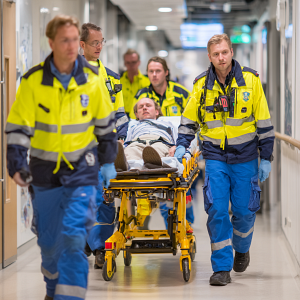Improving Patient Safety: The Role of Specialist Mental Health Ambulance Services in the UK

Mental health care is a critical component of the UK’s healthcare system, and ensuring safe, timely, and effective patient transport is a vital part of that care. Every year, hospitals and NHS trusts face challenges related to patient safety, bed management, and timely transfers. For individuals experiencing mental health crises or exhibiting challenging behaviours, traditional ambulance services may not always meet the specialised needs required for safe transport.
This is where mental health transport services provided by specialist providers like Secure24 come into play, offering patient-centred solutions designed to prioritise safety, protect staff, and optimise hospital resources. Special mental health ambulance services are making a real difference. They improve patient safety, shorten wait times, and make getting care much simpler, which helps patients, medical workers, and the whole community. Specifically, we will examine:-

- The challenges of mental health patient transfers in the UK.
- How specialist ambulances improve safety and efficiency.
- The benefits to hospitals, staff, and patients.
- How technology and training underpin modern mental health transport.
- Real-world examples of successful integration in NHS and private healthcare settings.
By the end, readers will understand why specialist mental health ambulance services are not just a logistical solution—they are central to patient safety and high-quality care.
The Challenges of Mental Health Patient Transfers
Transporting patients with mental health needs is far more complex than standard ambulance services. Individuals experiencing acute mental health crises may be highly anxious, distressed, or exhibit unpredictable behaviours, which makes safe transfer a unique challenge. Unlike routine medical transports, these situations require specialised skills, training, and approaches to protect both patients and staff. Even seemingly minor triggers can escalate quickly, making a calm, controlled, and structured transport process essential for everyone’s safety.
Key Challenges Include:
- Patient Safety Risks: During mental health crises, patients may experience sudden agitation, panic attacks, or aggressive behaviours. These episodes can put both the patient and staff at risk. Standard ambulance crews, trained primarily for physical health emergencies, may lack the specific expertise needed for safely managing behavioural crises. Without specialist support, transfers can become stressful, traumatic, or even dangerous. Specialist mental health transport teams are trained to anticipate triggers, employ de-escalation strategies, and maintain safety throughout the journey.
- Staff Protection: Think about healthcare staff: they pour compassion into every patient interaction, yet they must also safeguard their personal health. In mental health transfers, staff may encounter verbal aggression, physical threats, or emotionally charged situations. These folks learn how to talk through tense moments, quickly judge risks, and keep everyone safe when things get difficult. With fewer mistakes and less daily worry, our care teams stay energized and ready. They can then truly give their best to patients, keeping everyone well and safe.
- Hospital and System Strain: Delays or complications during mental health transfers can ripple through the healthcare system. Extended waiting times for admissions may block critical beds, creating backlogs in emergency departments and straining hospital resources. Patients may sometimes remain in unsuitable environments, such as emergency rooms, for hours or even days, which can worsen mental health conditions and slow recovery. Inefficient transfers also negatively affect hospital performance metrics, including patient flow and waiting time targets.
- Resource Allocation: Using standard ambulances for mental health transfers can tie up essential resources, reducing availability for urgent medical emergencies. Specialist mental health transport services allow hospitals and NHS trusts to allocate resources more efficiently, ensuring timely care for both mental health patients and those with acute medical needs. Optimising transport resources enhances operational efficiency while maintaining high standards of patient safety.
Reducing Waiting Times and Optimising Hospital Resources in Mental Health Patient Transport

Efficient patient transfers are critical for maintaining smooth hospital operations, particularly for individuals experiencing mental health crises. Delays in moving patients to the appropriate mental health facilities can create a cascade of challenges, including longer waiting times, limited bed availability, and increased pressure on hospital staff. Standard ambulance services, while effective for medical emergencies, may not always meet the specialised needs of mental health patients, leading to unnecessary delays and operational inefficiencies. Leaders in healthcare innovation, such as James Feen, have emphasised the importance of integrating specialised transport and digital solutions to streamline patient care and improve outcomes.
Specialist mental health ambulance services address these issues by combining trained personnel, purpose-built vehicles, and coordinated planning with hospitals. This approach ensures patients are transported safely, promptly, and with dignity, reducing stress for both patients and staff while supporting overall hospital efficiency.
Key Benefits Include:
- Reduced Waiting Times: Patients reach the right care facility more quickly, improving overall treatment timelines.
- Optimised Bed Availability: Faster transfers free up mental health beds, allowing hospitals to manage admissions more efficiently.
- Enhanced Staff Support: Hospital teams feel more supported and less stressed, improving morale and performance.
- Efficient Resource Allocation: Standard ambulances remain available for urgent medical emergencies, maximising system-wide efficiency.
- Seamless Integration: Coordination with hospital protocols and care teams ensures smooth workflows and fewer operational disruptions.
Real-World Impact
Hospitals using specialist mental health transport services report shorter patient wait times, fewer incidents during transfers, and improved patient satisfaction. Staff experience reduced stress, enabling them to focus on delivering high-quality care rather than managing logistical challenges. The combination of skilled personnel, specialist vehicles, and careful planning makes these services essential for maintaining operational efficiency within the UK healthcare system.
Training and Technology in Modern Mental Health Transport
The safe and efficient transport of mental health patients depends on a combination of highly trained staff and advanced technology. These elements work together to ensure patient safety, staff protection, and seamless integration with hospital workflows.
Staff Training
Mental health ambulance teams undergo rigorous, specialised training to prepare for the challenges of transporting patients in crisis. This training focuses on anticipating unpredictable behaviours and responding safely and effectively.
Key components of staff training include:
- Scenario-Based Exercises: Crews practice realistic situations, such as sudden agitation, panic attacks, or aggressive behaviour, to build confidence and quick decision-making skills.
- De-Escalation Techniques: Staff learn verbal and non-confrontational methods to calm potentially volatile situations, reducing stress and risk for both patients and personnel.
- Patient Communication: Effective communication fosters trust and reassurance, helping patients remain calm and cooperative during transport.
- Safe Handling Practices: Staff are trained to support patients physically when necessary while minimising the risk of injury.
- Regular Competency Assessments: Continuous evaluation ensures staff skills remain current with evolving mental health care best practices.
Technology and Communication
Advanced technology plays an equally important role in modern mental health transport. Real-time communication and data sharing enhance safety, efficiency, and operational transparency.
Benefits of technology integration include:
- Real-Time Updates: Teams provide continuous updates to hospitals, ensuring that receiving staff are fully prepared for patient arrival.
- Electronic Reporting and Tracking: Digital systems improve accountability, reduce errors, and allow for thorough documentation of each transfer.
- Integration with Hospital IT Systems: Seamless data sharing supports continuity of care, enabling hospital staff to access vital patient information immediately.
- Operational Efficiency: Technology helps optimise route planning, monitor patient status, and coordinate with healthcare providers, reducing delays and improving overall workflow.
By combining highly trained personnel with cutting-edge technology, modern mental health ambulance services ensure that patient transfers are safe, efficient, and patient-centred. Staff are prepared to handle complex situations calmly, while technology enhances communication, transparency, and continuity of care. This integrated approach not only protects patients and staff but also supports hospitals in maintaining high standards of service, ultimately contributing to better outcomes for individuals experiencing mental health crises.
Enhancing Patient Care and Community Wellbeing Through Specialist Mental Health Ambulance Services

Mental health ambulances really make a difference. They bring big advantages to patients, the medical teams, and the whole community. These services always put your safety and dignity first. They also work efficiently, helping patients get better and strengthening the whole health system
Benefits for Patients
Patients experiencing mental health crises often face stress, fear, or confusion during transport. Specialist services create a safe, calm, and supportive environment that reduces anxiety and improves overall patient experience. Key benefits include:
- Reduced Stress and Anxiety: Trained staff use de-escalation techniques and clear communication to reassure patients during transfers.
- Faster Access to Care: Timely transfers ensure patients reach the appropriate facility quickly, supporting better recovery outcomes.
- Respectful and Dignified Treatment: Privacy, autonomy, and patient dignity are maintained throughout the journey, fostering trust and comfort.
Benefits for Healthcare Staff
Healthcare professionals transporting mental health patients face unique challenges. Specialist services improve safety, reduce stress, and support better clinical care. Benefits include:
- Improved Safety: Trained personnel and purpose-built vehicles reduce risks associated with unpredictable patient behaviour.
- Reduced Workload and Stress: Staff can focus on clinical duties rather than managing complex transfers.
- Greater Confidence in Patient Outcomes: Knowing patients are transported by experts ensures better continuity of care and reduces uncertainty.
Benefits for the Community
The impact of specialist mental health transport extends beyond individual patients and staff, contributing to a more resilient and effective healthcare system. Key community benefits include:
- More Efficient Hospital Operations: Streamlined transfers free up beds and resources, benefiting all patients.
- Increased Awareness of Mental Health Needs: Specialist services highlight the importance of appropriate care pathways.
- Safer, More Resilient Healthcare Systems: Reduced incidents and optimised workflows contribute to a stronger, community-focused health infrastructure.
When skilled teams, special vehicles, and caring patient plans come together, mental health ambulances help people get better, ease staff workloads, and build a stronger health system for all.


